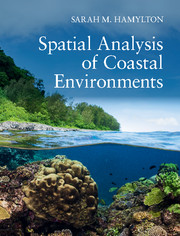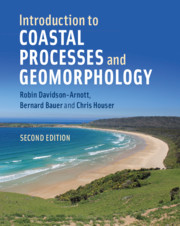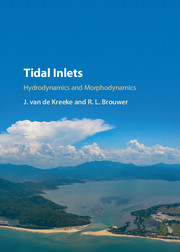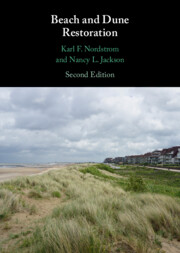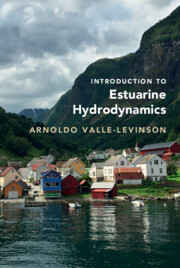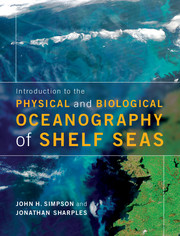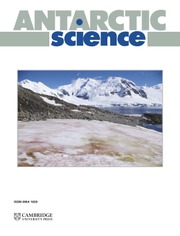Spatial Analysis of Coastal Environments
- Author: Sarah M. Hamylton, University of Wollongong, New South Wales
- Date Published: April 2017
- availability: Available
- format: Hardback
- isbn: 9781107070479
Hardback
Other available formats:
eBook
Looking for an inspection copy?
This title is not currently available for inspection. However, if you are interested in the title for your course we can consider offering an inspection copy. To register your interest please contact [email protected] providing details of the course you are teaching.
-
At the convergence of the land and sea, coastal environments are some of the most dynamic and populated places on Earth. This book explains how the many varied forms of spatial analysis, including mapping, monitoring and modelling, can be applied to a range of coastal environments such as estuaries, mangroves, seagrass beds and coral reefs. Presenting empirical geographical approaches to modelling, which draw on recent developments in remote sensing technology, geographical information science and spatial statistics, it provides the analytical tools to map, monitor and explain or predict coastal features. With detailed case studies and accompanying online practical exercises, it is an ideal resource for undergraduate courses in spatial science. Taking a broad view of spatial analysis and covering basic and advanced analytical areas such as spatial data and geostatistics, it is also a useful reference for ecologists, geomorphologists, geographers and modellers interested in understanding coastal environments.
Read more- Presents detailed international case studies with a broad geographical range, with examples from California, New York, France, Australia, Saudi Arabia, the Seychelles, the Chagos Islands and Argentina, encouraging readers to think spatially while exposing them to a range of global coastal problems
- Uses clearly drafted figures and accessible language to convey complex ideas
- Includes chapter summary points, a comprehensive glossary and appendices of electronic exercises
Reviews & endorsements
'I wish this book had been around when I was a student! It ticks all the boxes: the primary focus on spatial analysis and interrogation of geospatial data is essential for sound, sustainable and evidence-based decision-making, and will give invaluable practical skills to students and practitioners alike; while the adoption of landscape ecology as the underpinning conceptual framework emphasises the need for joined-up, holistic and ultimately spatially-determined thinking in coastal science and management. The author shows a deep understanding of her subject matter, and her enthusiasm for, and love of, the coast stands out. Even the more complex ideas and methods are explained clearly and in an easily accessible, student-friendly manner. Although written for students of the coast, many of the concepts and methods introduced here will be readily transferrable to other areas of Earth Science specialism where geospatial expertise is needed.' Darius Bartlett, University College Cork, Ireland
See more reviews'Spatial Analysis of Coastal Environments is a rare and overdue resource that provides a comprehensive overview as well an introduction to an array of important spatial analytical techniques and issues. Students and professionals new to coastal geographic information systems (GIS) will find the introductory coverage of data sources, mapping principles and analysis techniques easily accessible. Experienced researchers, coastal managers and planners, and instructors will take value from the coverage of advanced techniques such as geostatistics, modelling, and characterising uncertainty. The book is richly and usefully illustrated with both conceptual and case study maps and graphics. I expect this book to fill an important void and, through its readers, further expand the scientific and practical application of GIS to coastal environments.' Thomas R. Allen, Old Dominion University, Virginia
'It should become essential reading for students of coastal environments, demonstrating how spatial analysis methods, together with geographic information systems (GIS), can enrich and bring new insights to the study of this important field.' Robert Haining, University of Cambridge
'The text is accessible and well-written, and the chapters are well-structured. … I believe that the strongest selling point of this book is that Hamylton covers critical concepts that are all too often disregarded in other publications. The author does not present spatial analysis as a panacea and acknowledges the limitations of the approaches that are presented. … In conclusion, I would recommend Spatial Analysis of Coastal Environment for its scope and breadth (i.e., basic geographical analyses, mapping, monitoring, and explanatory and predictive modeling), well-defined terminology, multidisciplinary perspective, and treatment of concepts like spatial scale, data quality, and communication.' Vincent Lecours, Frontiers of Biogeography
Customer reviews
Not yet reviewed
Be the first to review
Review was not posted due to profanity
×Product details
- Date Published: April 2017
- format: Hardback
- isbn: 9781107070479
- length: 306 pages
- dimensions: 253 x 194 x 20 mm
- weight: 0.93kg
- contains: 88 b/w illus. 48 colour illus. 30 tables
- availability: Available
Table of Contents
Foreword
Preface
1. The application of spatial analysis to coastal environments
2. The nature of spatial data
3. Basic geographical analysis with spatial information in coastal environments
4. Mapping coastal environments
5. Monitoring coastal environments
6. Geostatistical analysis of coastal environments
7. Modelling coastal environments
8. Addressing uncertainty in the spatial analysis of coastal environments
9. Communicating and incorporating the results of spatial analysis successfully
Glossary
References
Index.-
General Resources
Lecturer Resources
Find resources associated with this title
Type Name Unlocked * Format Size Showing of
This title is supported by one or more locked resources. Access to locked resources is granted exclusively by Cambridge University Press to lecturers whose faculty status has been verified. To gain access to locked resources, lecturers should sign in to or register for a Cambridge user account.
Please use locked resources responsibly and exercise your professional discretion when choosing how you share these materials with your students. Other lecturers may wish to use locked resources for assessment purposes and their usefulness is undermined when the source files (for example, solution manuals or test banks) are shared online or via social networks.
Supplementary resources are subject to copyright. Lecturers are permitted to view, print or download these resources for use in their teaching, but may not change them or use them for commercial gain.
If you are having problems accessing these resources please contact [email protected].
Sorry, this resource is locked
Please register or sign in to request access. If you are having problems accessing these resources please email [email protected]
Register Sign in» Proceed
You are now leaving the Cambridge University Press website. Your eBook purchase and download will be completed by our partner www.ebooks.com. Please see the permission section of the www.ebooks.com catalogue page for details of the print & copy limits on our eBooks.
Continue ×Are you sure you want to delete your account?
This cannot be undone.
Thank you for your feedback which will help us improve our service.
If you requested a response, we will make sure to get back to you shortly.
×
